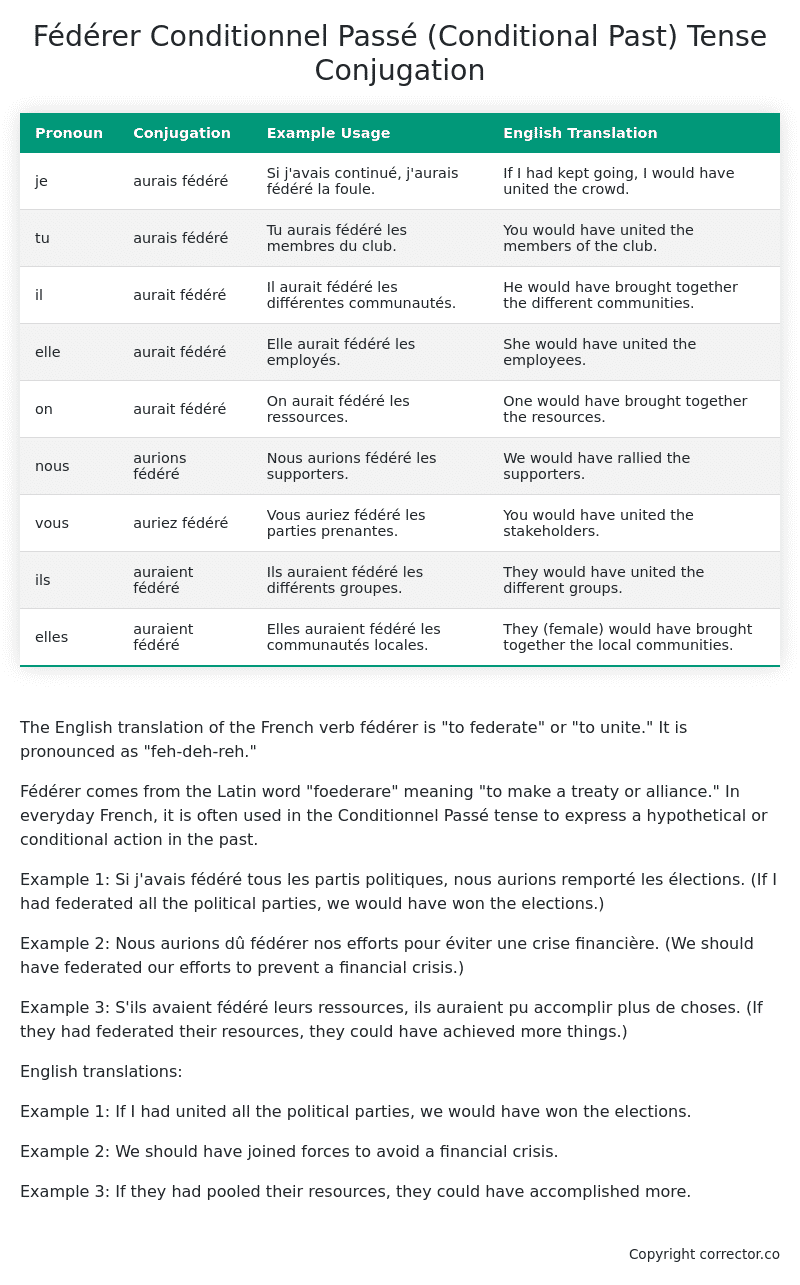Conditionnel Passé (Conditional Past) Tense Conjugation of the French Verb fédérer
Introduction to the verb fédérer
The English translation of the French verb fédérer is “to federate” or “to unite.” It is pronounced as “feh-deh-reh.”
Fédérer comes from the Latin word “foederare” meaning “to make a treaty or alliance.” In everyday French, it is often used in the Conditionnel Passé tense to express a hypothetical or conditional action in the past.
Example 1: Si j’avais fédéré tous les partis politiques, nous aurions remporté les élections. (If I had federated all the political parties, we would have won the elections.)
Example 2: Nous aurions dû fédérer nos efforts pour éviter une crise financière. (We should have federated our efforts to prevent a financial crisis.)
Example 3: S’ils avaient fédéré leurs ressources, ils auraient pu accomplir plus de choses. (If they had federated their resources, they could have achieved more things.)
English translations:
Example 1: If I had united all the political parties, we would have won the elections.
Example 2: We should have joined forces to avoid a financial crisis.
Example 3: If they had pooled their resources, they could have accomplished more.
Table of the Conditionnel Passé (Conditional Past) Tense Conjugation of fédérer
| Pronoun | Conjugation | Example Usage | English Translation |
|---|---|---|---|
| je | aurais fédéré | Si j’avais continué, j’aurais fédéré la foule. | If I had kept going, I would have united the crowd. |
| tu | aurais fédéré | Tu aurais fédéré les membres du club. | You would have united the members of the club. |
| il | aurait fédéré | Il aurait fédéré les différentes communautés. | He would have brought together the different communities. |
| elle | aurait fédéré | Elle aurait fédéré les employés. | She would have united the employees. |
| on | aurait fédéré | On aurait fédéré les ressources. | One would have brought together the resources. |
| nous | aurions fédéré | Nous aurions fédéré les supporters. | We would have rallied the supporters. |
| vous | auriez fédéré | Vous auriez fédéré les parties prenantes. | You would have united the stakeholders. |
| ils | auraient fédéré | Ils auraient fédéré les différents groupes. | They would have united the different groups. |
| elles | auraient fédéré | Elles auraient fédéré les communautés locales. | They (female) would have brought together the local communities. |
Other Conjugations for Fédérer.
Le Present (Present Tense) Conjugation of the French Verb fédérer
Imparfait (Imperfect) Tense Conjugation of the French Verb fédérer
Passé Simple (Simple Past) Tense Conjugation of the French Verb fédérer
Passé Composé (Present Perfect) Tense Conjugation of the French Verb fédérer
Futur Simple (Simple Future) Tense Conjugation of the French Verb fédérer
Futur Proche (Near Future) Tense Conjugation of the French Verb fédérer
Plus-que-parfait (Pluperfect) Tense Conjugation of the French Verb fédérer
Passé Antérieur (Past Anterior) Tense Conjugation of the French Verb fédérer
Futur Antérieur (Future Anterior) Tense Conjugation of the French Verb fédérer
Subjonctif Présent (Subjunctive Present) Tense Conjugation of the French Verb fédérer
Subjonctif Passé (Subjunctive Past) Tense Conjugation of the French Verb fédérer
Subjonctif Imparfait (Subjunctive Imperfect) Tense Conjugation of the French Verb fédérer
Subjonctif Plus-que-parfait (Subjunctive Pluperfect) Tense Conjugation of the French Verb fédérer
Conditionnel Présent (Conditional Present) Tense Conjugation of the French Verb fédérer
Conditionnel Passé (Conditional Past) Tense Conjugation of the French Verb fédérer (this article)
L’impératif Présent (Imperative Present) Tense Conjugation of the French Verb fédérer
L’infinitif Présent (Infinitive Present) Tense Conjugation of the French Verb fédérer
Struggling with French verbs or the language in general? Why not use our free French Grammar Checker – no registration required!
Get a FREE Download Study Sheet of this Conjugation 🔥
Simply right click the image below, click “save image” and get your free reference for the fédérer Conditionnel Passé tense conjugation!

Fédérer – About the French Conditionnel Passé (Conditional Past) Tense
Formation
Common Everyday Usage Patterns
Expressing Unreal Past Scenarios
Polite Requests or Suggestions
Expressing Doubt or Uncertainty
Interactions with Other Tenses
Conditional Present
Indicative Past Tenses
Conditional Future
Summary
Want More?
I hope you enjoyed this article on the verb fédérer. Still in a learning mood? Check out another TOTALLY random French verb conjugation!


